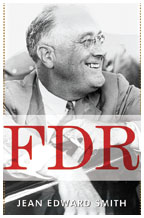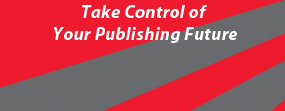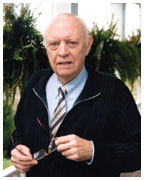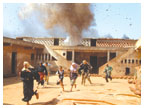May 9, 2007: Books and Arts
Examining FDR
Jean Edward Smith ’54 pens a biography of a master politician
The situation in Iraq
Filmmaker Philip Haas tries to get behind the headlines
For a complete list of books received, click here.
In his biography of FDR, Jean Edward Smith ’54 explores the president’s relationship with his mother, Sara. (Courtesy Random House) |
Reading
Room
Examining
FDR
Jean Edward Smith ’54 pens a biography of a master politician
By Jane Carr ’00
For Jean Edward Smith ’54, the process of writing a biography is regimented. Once his research is completed, he adheres to a strict writing schedule: Get up at 5:30 a.m., be at the desk by 7:30 a.m., and write until noon. “Seven days a week, 48 weeks a year,” Smith says, and “in three years, you will have a 1,300-page manuscript.”
That practice has served him well. Smith has written 12 books, including four biographies, one of which, on Ulysses S. Grant, was a finalist for the 2002 Pulitzer Prize. He says his fascination with biography springs from childhood, when his grandmother read biographies aloud to him. “I write about people I admire,” he says.
 His latest
project is FDR, published by Random House this month. Born in
Washington, D.C., three weeks before Roosevelt’s election to the
presidency in 1932, Smith felt he needed a surefooted publication history
before undertaking a book about a man who was a hero to him as a child
and to whom he now refers as a “master politician” and an
exceptional leader who saved the United States from economic oblivion
and military defeat.
His latest
project is FDR, published by Random House this month. Born in
Washington, D.C., three weeks before Roosevelt’s election to the
presidency in 1932, Smith felt he needed a surefooted publication history
before undertaking a book about a man who was a hero to him as a child
and to whom he now refers as a “master politician” and an
exceptional leader who saved the United States from economic oblivion
and military defeat.
Rather than attempting to uncover groundbreaking material about the 32nd president, Smith’s book brings crucial facets of Roosevelt’s life and career into sharper relief. One of the most illuminating aspects of FDR is the depth of the relationship Smith reveals between Roosevelt and his mother, Sara. In Smith’s view, it was from Sara that Roosevelt acquired his “unquenchable confidence.” After the death of Roosevelt’s father, James, Sara assumed personal and financial control of the estate while nurturing her son’s career, first moving to be near him at Harvard Law School, and later taking an active role in organizing for his gubernatorial and presidential campaigns.
Though previous biographies have traced Roosevelt’s marital complexities, Smith’s work takes a broader look at the important relationships between the president and the women in his life, including his wife, Eleanor, as well as his longtime lover, Lucy Mercer Rutherford, and his dedicated secretary, Missy LeHand. Smith also gives a clear-eyed assessment of the triumphs and failures of Roosevelt’s presidency, from saving the banking system in 1933 to forcibly removing Japanese-Americans from their homes in 1942.
Smith, who majored in politics at Princeton, will continue to examine
the American presidency in his next project, a biography of Dwight D.
Eisenhower. As for what contemporary leaders might learn from Roosevelt,
Smith cites the president’s capacity to connect with people as among
his most relevant leadership skills. FDR’s radio fireside chats,
he says, are a perfect example. “He brought the country along with
him,” Smith says, fostering political gravitas while establishing
an intimate relationship and understanding with the American people. ![]()
Jane Carr ’00 is a writer and graduate student in Charlottesville, Va.
For a complete list of books received, click here.
 Heal Your Aching Back: What a Harvard Doctor Wants You to Know About Finding
Relief and Keeping Your Back Strong — Jeffrey N. Katz ’80
and Gloria Parkinson (McGraw Hill). Katz describes what causes back pain,
how to choose a doctor, and the treatments available. He argues that the
best way to relieve pain is through movement and exercise. Katz is an
associate professor of medicine and orthopedic surgery at Harvard Medical
School. Parkinson is a writer specializing in health topics.
Heal Your Aching Back: What a Harvard Doctor Wants You to Know About Finding
Relief and Keeping Your Back Strong — Jeffrey N. Katz ’80
and Gloria Parkinson (McGraw Hill). Katz describes what causes back pain,
how to choose a doctor, and the treatments available. He argues that the
best way to relieve pain is through movement and exercise. Katz is an
associate professor of medicine and orthopedic surgery at Harvard Medical
School. Parkinson is a writer specializing in health topics.
 Thoreau’s Laundry — Ann Harleman *72 (Southern Methodist
University Press). In this collection of 12 short stories, the characters
confront love and loss as they deal with political and social upheaval,
including the onset of World War I, the Cold War, and 9/11. The title
story explores the feelings of a woman who must decide whether she can
continue to care for her husband, who suffers from a degenerative illness.
Harleman teaches fiction writing and literature at the Rhode Island School
of Design.
Thoreau’s Laundry — Ann Harleman *72 (Southern Methodist
University Press). In this collection of 12 short stories, the characters
confront love and loss as they deal with political and social upheaval,
including the onset of World War I, the Cold War, and 9/11. The title
story explores the feelings of a woman who must decide whether she can
continue to care for her husband, who suffers from a degenerative illness.
Harleman teaches fiction writing and literature at the Rhode Island School
of Design.
 Two Kinds of Truth: Stories and Reportage From China —
Liu Binyan, edited by Perry Link (Indiana University Press). In this collection
of nine pieces — including reporting, fiction, and essays —
the Chinese investigative journalist Liu Binyan reflects on the consequences
of the Cold War, the roots of global terrorism, and whether “socialism
with a human face” is possible. Binyan lived in exile from 1988
until his death in 2005. Also included is an interview with Binyan by
Link, a professor of East Asian studies at Princeton.
Two Kinds of Truth: Stories and Reportage From China —
Liu Binyan, edited by Perry Link (Indiana University Press). In this collection
of nine pieces — including reporting, fiction, and essays —
the Chinese investigative journalist Liu Binyan reflects on the consequences
of the Cold War, the roots of global terrorism, and whether “socialism
with a human face” is possible. Binyan lived in exile from 1988
until his death in 2005. Also included is an interview with Binyan by
Link, a professor of East Asian studies at Princeton.
By K.F.G.
Philip Haas, left, directs on the set of “The Situation” in Morocco in 2005. Depicted in the still, above, is the film’s final battle scene, when Americans attack an Iraqi resistance leader in a small village. (photos courtesy Philip Haas) |
The
situation in Iraq
Filmmaker Philip Haas tries to get behind the headlines
Director Philip Haas’ latest independent film, The Situation, is set in Samarra, Iraq, in 2004. It follows the story of an American journalist, Anna, as she tries to uncover who killed her Iraqi friend and trusted source, Rafeeq, and ultimately finds her own life in danger. Anna is modeled after the screenwriter, journalist Wendell Steavenson, who reported from Iraq. The film, which was released this winter and is playing in theaters in the United States, focuses on American and Iraqi characters and dramatizes the human stories, particularly those of Iraqis, behind the headlines. The DVD of the film will be released in late July. Haas, whose other independent films include Angels and Insects and documentaries about artists, is teaching screenwriting and documentary filmmaking this semester at Princeton. He spoke with PAW’s Katherine Federici Greenwood.
Why did you make this film?
I made it to answer a question of my own, which was why I was becoming more and more deadened by the news [of the Iraq war]. The reporting seemed to contribute to it, because the numbers of people dying and being displaced were so overwhelming, and the reporting wasn’t personalized. And by not having a [military] draft, it’s less affecting. Also, the level of rhetoric coming from the administration obfuscates. The film tries to address that [by asking] what is the truth? And the character Dan Murphy [an American intelligence official], said, “Well, there is no truth.” The film tries to dispel the idea that there are good guys and bad guys.
How much of the story line is true to the screenwriter’s life as a journalist in Iraq?
The event at the bridge in the beginning, [when American soldiers throw two Iraqi teenagers off a bridge during an interrogation] is something that she covered. ... When I talked to her about writing it, the model was somebody like Graham Greene, the writer who lived in Vietnam and out of that experience wrote The Quiet American. So it’s a reworking of her life’s experience. I wasn’t so keen on the central character being a journalist, but that’s what she knew.
The film doesn’t have that glamorous Hollywood look. Was that intentional?
Yes. Part of it was to try not to have that look, to try to make you feel like you were there. The idea was to shoot it in almost a documentary vein, to not be overly conscious that it was a movie. We used handheld cameras, which gives it a kind of immediacy. Although there is a music score, we didn’t use it for the big battle. The dramatic stuff unfolds as if you were there, with no music. The violence is kind of deliberately gratuitous in the way that it is in Iraq. A kid gets shot and nothing is made of it.
At the screening in Princeton in February, a few audience members asked you how the United States should resolve the situation, as if you were an expert. Did that surprise you?
If you think of Vietnam films that came after the Vietnam war, like Apocalypse Now, I don’t think people were asking Francis Ford Coppola, “What do you think is going on in Vietnam now?” One of the exciting things about making a film about Iraq now is that you are part of the political and social debate, as opposed to commenting on it as something historical.
How have people who do support the war reacted to the screenings?
I originally thought the film would be preaching to the converted. But
some of the strongest supporters of the movie have told me, “I’m
a Republican. I voted for Bush. This is a fair movie.” I think if
Bush himself saw the movie, and didn’t walk out, he would probably
say, “It’s a crazy place over there.” If you look at
it, probably the most corrupt person in the film is the sheikh. And the
most corrupt American, the major, gets his comeuppance. It’s not
like the Americans are bad and the Iraqis are good. The film is an investigation
into why the country is so unsettled. ![]()



